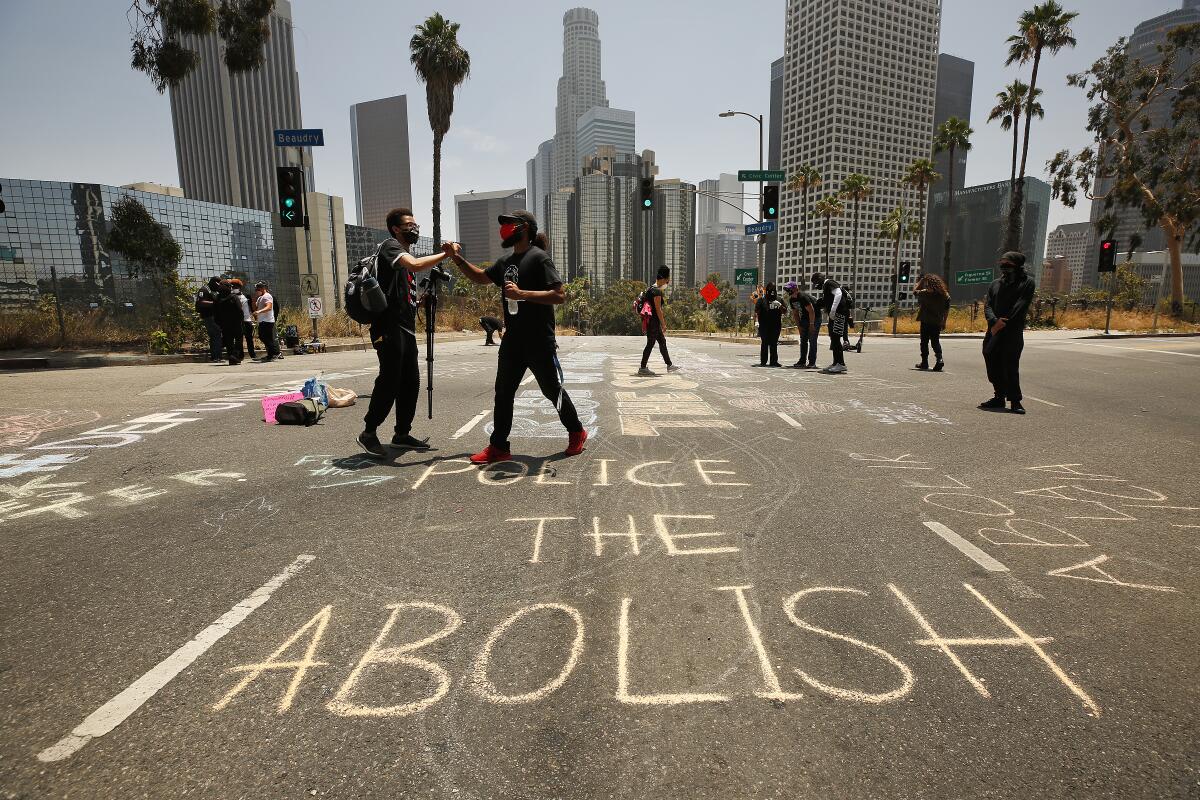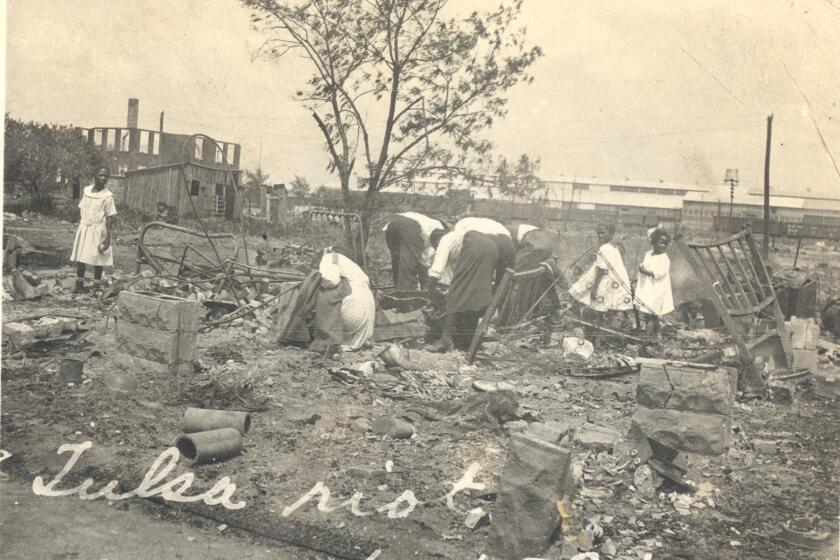Editorial: Abolish the police? No. Reform policing? Absolutely

- Share via
As talks continue in the Senate over the George Floyd Justice in Policing Act of 2021, a comprehensive bill to improve and monitor police behavior, the main bone of contention is how best to hold police officers accountable for misconduct, such as the excessive force that injures and sometimes kills so many Americans, a disproportionate number of them Black men. In the background is a continuing debate that was magnified last year by the sometimes violent anti-police and anti-racism protests following Floyd’s murder — and especially by the reelection campaign of President Trump, many of whose backers argued that there was little about police conduct that needed to be altered, particularly not while violent crime was rising precipitously in major American cities.
But there is another debate, another fracture, that is at least as important as the mostly left-right one that divides police reformers from backers of the status quo. On this second front, reformers quietly defend their plans for better officer training, discipline, oversight and accountability against a vocal generation of protesters and activists who argue that the idea of reforming the police is a liberal fantasy.
To support their case they point to decades of procedural and legislative changes that have left us with police who are still too quick to shoot and still too apt to harass or dehumanize members of Black, Latino and impoverished communities whom they are sworn to protect and serve.
In fact, much of the “defund the police” movement directly opposes traditional police reforms, which require larger, not smaller, budgets in order to invest in technologies like body cameras, procedural changes like oversight commissions and programs like the Los Angeles Police Department’s Community Safety Partnership, which embeds police officers in public housing projects and troubled neighborhoods to build trust between officers and residents.
That’s money, say defunders and abolitionists, that should be spent not on police but on healthcare, schools and jobs.
The Times Editorial Board examines the reckoning of the last year and considers what it means for policing and protest in Los Angeles and elsewhere.
That position was expressed on the street last summer and, in L.A., in City Council, Police Commission and other agencies’ public hearings on city budgets and police conduct. Donna Harati, director of legal service for Homeboy Industries, offered a common sentiment in a statement to a Police Commission task force last summer.
“The only answer to stopping the harm and violence police cause communities is to stop the contact between police and communities,” Harati said. “This requires shrinking the size and scope of policing and increasing meaningful investments in communities. We need to police people less and invest in communities more.”
Numerous other speakers offered similar sentiment but were considerably less civil, their comments dripping with anger and ridicule toward police and politicians and ending with a sign-off of, “And by the way, f— you.”
Many critics call for outright abolition of police, and the stance is attractive when police are seen in the historical context of enforcers of a racist status quo created by white society to keep freed Black Americans and other people of color in their place. It’s not an altogether accurate view of history, but not wholly inaccurate, either. If police are framed as successors to slave-catching patrols, then police abolition takes on the aura of basic morality, and “reform” is tinged with the distasteful notions of gradualism that made racial segregation a fixture in the laws of many states for more than a century after emancipation.
But American policing, if indeed partially a successor to slave patrols, is also the descendant of the British model of professional, concierge-like problem-solvers who work in concert with residents to prevent small offenses or disputes from getting out of hand. The LAPD, heirs to both models, was once known to beat homeless “vagrants” in order to drive them out of town and — at the same time — to obligingly arrange housing for new residents.
Abolish police and the vacuum will be filled — by private security officers hired by corporations that answer to investors instead of voters, by self-appointed armed and angry vigilantes, by gangs collecting “taxes” on businesses and residents in return for protection. Professional policing is the nation’s pride, separating the U.S. from countries patrolled by private forces. And it is the nation’s shame — its dark id — inflicting heartless, needless death because our gun-loving society is over-armed, and because police enforce and respond to patterns of race, class and wealth to which we still cling, unwittingly or otherwise.
So we must reform. We must advocate for the George Floyd Justice in Policing Act. We must improve accountability, require (and pay for) bodycams, update training, mold police culture to further embrace the concierge model and let go of the occupier ethic. We must divert police away from jobs unsuited to them, like serving the homeless or mentally ill in crisis, and fund professionals better suited to those tasks. It’s less bracing than “abolition” and less catchy than “defund.” But we’re in it for the long haul, to save lives and build a better, more just and freer society.
This is the sixth editorial in a series.
More to Read
A cure for the common opinion
Get thought-provoking perspectives with our weekly newsletter.
You may occasionally receive promotional content from the Los Angeles Times.











